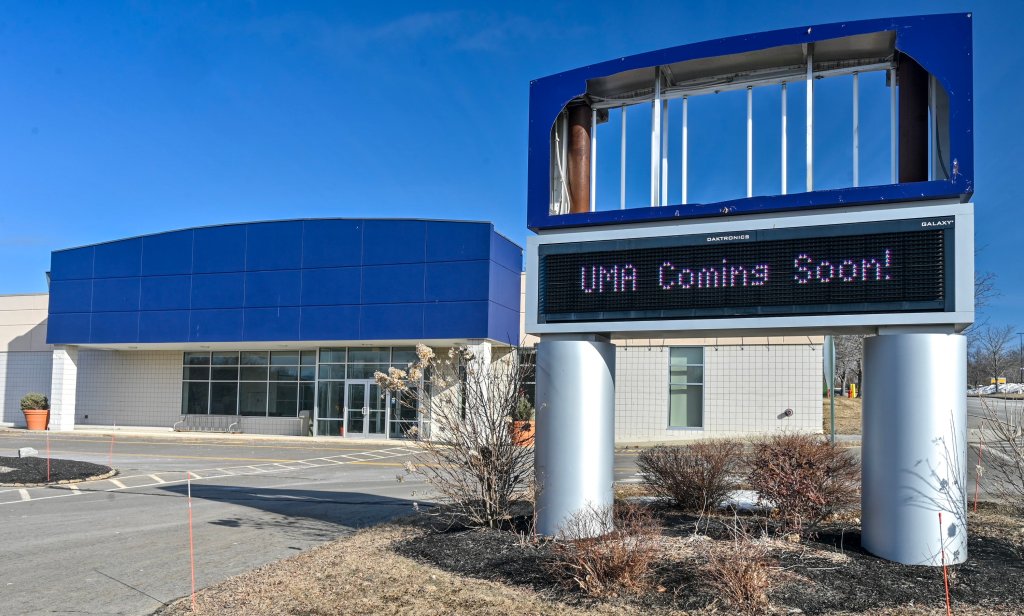
The 20,000-square-foot University of Maine at Augusta Capital Center will expand workforce opportunities in nursing and cybersecurity. (Joe Phelan/Staff Photographer)
The University of Maine at Augusta plans to unveil a new building that will make use of technology to better prepare students for the workforce on Tuesday.
At 20,000 square feet, the Capital Center in the Marketplace at Augusta will allow the nursing and cybersecurity workforce development programs to expand while integrating the use of technology to enrich students’ learning experience.
University officials and dignitaries will celebrate its opening, including Maine’s two U.S. senators, Republican Susan Collins and independent Angus King, who both helped secure more than $7 million in congressionally directed funding for the renovation. MaineGeneral Health also provided funding.
The new space will allow UMA’s nursing enrollment to increase by 20%, reaching up to 400 students and provide advanced training capacity in cybersecurity, helping to address workforce shortages in both critical fields.
The technology at the Capital Center will bring the two quick-growing programs up to the next step, said Brenda McAleer, UMA’s associate vice president of academic affairs and dean of the College of Professional Studies.
UMA has made strides over the years to improve its offerings by launching new majors, expanding programs beyond its Augusta campus and through adding campus housing, which the college first opened in 2019.
UMA has two academic colleges at the university: The College of Arts & Sciences and the College of Professional Studies. The College of Professional Studies houses the nursing and cybersecurity programs, as well as programs that include dental hygiene, mental health and human services and justice studies. Most of UMA’s majors — including nursing and cybersecurity — can be completed online or in person.
“Both of the programs housed in the new Capital Center demonstrate the commitment of UMA to provide Maine people with affordable and accessible higher education and to join with private-sector partners to address workforce needs,” said Sen. Collins Monday afternoon. “I was pleased to secure funding to support these projects, which will increase opportunities for students to gain the hands-on training they need to succeed in critical health care and cybersecurity roles.
For the Cybersecurity Workforce Development program, the new building acts as a range, a closed system where those inside it can act as an IT System and simulate cyber attacks.
The nursing program has always been attractive, McAleer said, as UMA’s program is one of only 15 nursing schools across the country licensed by the American Holistic Nurses Credentialing Corp. It will have new simulation technology to allow students to feel what working in a hospital is like.
“In one of the rooms, we have what’s called an immersion room where three sides are floor-to-ceiling screens,” McAleer said. “You walk into the room and it’s like walking into MaineGeneral. It simulates the emergency room, or the operating room, or the maternity ward. It’s not like walking into the classroom, but into the actual room at the hospital.”
In selecting successful programs for students, McAleer said school officials pay close attention to statistics from the state and federal labor departments.
In Maine, a nurse practitioner has the fastest projected job growth rate in the state, according to state statistics. Behind it are data scientists, with information security analysts in third and physician assistants in fourth for projected job growth rate in Maine, all of which go with UMA’s expanded offerings.
McAleer said that potential students may offer ideas as to what they want to see on campus and the university is committed to meeting those needs.
“Our admission councilors will hear a lot of folks talking about programs that they want to see, saying they want ‘this’ or ‘that’ and we can look at the viability and see if its worth investing in. Maybe we start with a certificate or a minor and see if it will meet a need and if it does, we can expand it,” she said.
UMA is part of the University of Maine System and has nearly 6,000 students, half of which are enrolled full-time. The university has eight locations across the state in addition to its Augusta campus.

We invite you to add your comments. We encourage a thoughtful exchange of ideas and information on this website. By joining the conversation, you are agreeing to our commenting policy and terms of use. More information is found on our FAQs. You can modify your screen name here.
Comments are managed by our staff during regular business hours Monday through Friday as well as limited hours on Saturday and Sunday. Comments held for moderation outside of those hours may take longer to approve.
Join the Conversation
Please sign into your CentralMaine.com account to participate in conversations below. If you do not have an account, you can register or subscribe. Questions? Please see our FAQs.